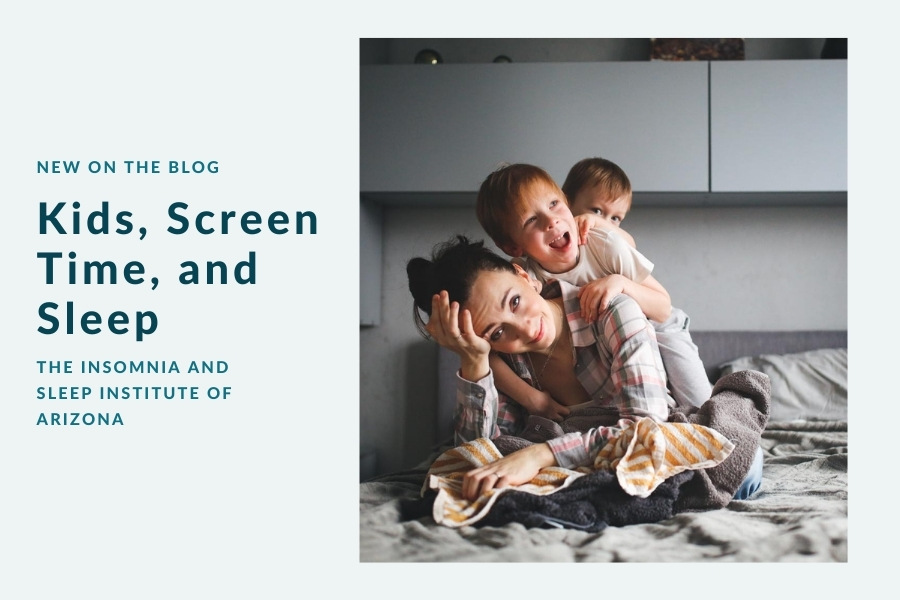Ask any parent what screen time does to a child’s sleep, and you’ll probably hear that screen time leads to poor sleep quality—but that isn’t always the case according to one recent study. At The Insomnia and Sleep Institute of Arizona, we treat patients as young as two years old and every initial consultation is with a sleep expert who can diagnose sleep disorders. We are proud to set the standard for sleep medicine in Arizona with an outcome-driven approach. Staffed by sleep specialists who are dedicated to sleep medicine, if you need support helping your child get the sleep they need, it’s time to contact the “Top Doc” in sleep medicine (as voted by peers for the last six years).
Research published in the September 8, 2021 edition of PLOS One found that children who get a lot of screen time are only “slightly more likely” to have disturbed sleep. Further, these children are also only slightly more likely to have attention disorders, depression, anxiety, and lower grades. This was one of the biggest studies examining screen time and children, and the results are undoubtedly surprising.
What Research Reveals on Kids and Sleep
According to lead author Katie Paulich, “These findings suggest that we should be mindful of screens, but that screen time is likely not inherently harmful to our youth.” Recall the era when a parent’s biggest fear was their child sitting “too close to the television.” There were many ideas of what might happen, but ultimately children who grew up glued to the television are not apparently any worse for wear because of it. Today, “screen time” usually means staring at a phone or tablet—and often just as close, if not closer, than many adults who grew up with televisions.
In fact, there were even some positives the research uncovered. It was found that kids who had a lot of screen time also had more close friends. The study, which was based at the Institute for Behavioral Genetics, looked at data from the Adolescent Brain and Cognitive Development study (an ongoing study that is the biggest long-term study in the United States). Information gathered included data from 11,800 children who were nine and ten years old. The children were asked questions about screen time and parents reported issues with grades and behavior. Mental health assessments were also taken to curb biases.
What the Numbers Reveal
Researchers found that boys spent 45 minutes more every day with screens compared to girls. The amount of time topped out at five hours per day on weekends and four on weekdays. It was also revealed that boys and girls use their screen time differently. Boys spent twice as much time playing video games and girls spent a lot more time on social media. It should be pointed out that these figures were assessed prior to COVID-19, and it can be assumed that children are spending much more time online now with virtual school being so common.
However, it should be stressed that kids who had more screen time did also have worse sleep, poorer behavior, and lower grades. The surprising fact is that the severity of these circumstances is not as extreme as previously (or anecdotally) thought. Ultimately, researchers say that in comparison to other factors, screen time influence was relatively minimal. Some of these other factors include socioeconomic status, which has 2.5 times greater impact on a child’s behavior than screen time. In total, screen time accounts for just two percent of variations in behavior, sleep, and grades compared to other factors.
Improving Your Child’s Sleep
Senior author John Hewitt says, “A number of papers in recent years have suggested that screen time might be harmful for children, but there have also been some reviews that suggest those negative effects have been overestimated … yes, there are relationships between screen time and negative outcomes, but they are not large and not dire.” In fact, in some cases screens can have a positive calming effect. For example, children who act in an aggressive manner might be regulated with a video game. Perhaps it is the kind of screen time that is more important than the amount. Video games can benefit relationships (especially multi-player games) while bingeing television alone might have negative outcomes.
The American Academy of Pediatrics provides screen time guidelines for kids under five, but none for those who are older. If your child is struggling with sleep, reducing or removing screen time might not be the answer. Schedule a consultation with a pediatric sleep specialist at The Insomnia and Sleep Institute today by calling the office or, for the quickest response, complete the online form.





